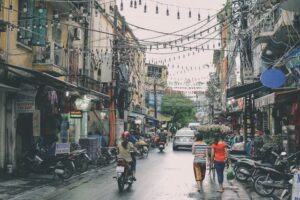Are you thinking about purchasing property in the country of those with Dragon lineage? Are you curious about the pricing and if it is reasonably situated?
The concept of market timing is a subject that individuals have varying opinions on. For instance, the real estate agent you spoke to in Vietnam could suggest that it is currently a favorable time to purchase property, whereas your childhood friend from Hanoi might recommend waiting and being more patient before finalizing any decisions.
If you are looking to invest as an expat or high-net-worth individual, which is what I specialize in, you can email me (advice@adamfayed.com) or WhatsApp (+44-7393-450-837).
Investing in real estate is a proven strategy for building wealth, and Vietnam real estate is emerging as a hot new trend for savvy investors. With its rapidly growing economy, favorable investment climate, and attractive property market, Vietnam is becoming a top choice for those seeking solid returns.
Growth and Potential of Vietnam Real Estate Market
The Vietnam real estate market has experienced significant growth in recent years. The country’s strong economic performance, fueled by robust manufacturing and export sectors, has driven demand for residential and commercial properties. The urbanization trend, with more people moving from rural areas to cities in search of better job opportunities, has further fueled the demand for housing.
According to a report by JLL, a leading real estate services firm, the Vietnam real estate market is expected to continue its upward trajectory in the coming years. The report predicts that the market will benefit from increased foreign direct investment, improved infrastructure, and favorable government policies.
Factors Driving Investment in Vietnam Real Estate
Several factors contribute to the growing interest in the Vietnam real estate market. Firstly, the country has a young and dynamic population, with a median age of just 30.
This demographic advantage translates into a strong demand for housing, particularly in urban areas. Additionally, the rising middle class and increasing disposable incomes have led to a surge in consumer spending, including in the real estate sector.
Another key factor driving investment in Vietnam real estate is the favorable investment climate. The Vietnamese government has taken steps to attract and protect foreign investors.
Measures such as simplified procedures for property ownership and tax incentives have made it easier for foreigners to invest in the country’s real estate market.
Furthermore, Vietnam’s strategic location in Southeast Asia makes it an attractive destination for businesses and investors. The country’s membership in various regional trade agreements, such as the ASEAN Free Trade Area and the Comprehensive and Progressive Agreement for Trans-Pacific Partnership, provides access to a large and growing market.
Pros and Cons of Investing in Vietnam Real Estate
Benefits of Investing in Vietnam Real Estate
Investing in Vietnam real estate offers several benefits for investors. Firstly, the property market in Vietnam has shown strong capital appreciation over the years. As the country continues to attract foreign direct investment and experience economic growth, property values are expected to increase.

Additionally, investing in real estate in Vietnam can provide a stable source of rental income. The high demand for housing, particularly in urban areas, ensures a steady stream of tenants. Rental yields in major cities like Ho Chi Minh City and Hanoi are comparatively high, offering attractive returns for investors.
Moreover, investing in Vietnam real estate provides diversification benefits for investors looking to expand their portfolio. With its growing economy and positive outlook, Vietnam offers an alternative investment option to traditional assets such as stocks and bonds.
Risks of Investing in Vietnam Real Estate
While Vietnam’s real estate market offers promising opportunities, there are also risks and challenges to consider. One potential risk is the volatility of property prices. Like any market, real estate prices can fluctuate based on various factors such as economic conditions, market sentiment, and government policies.
Another challenge is the lack of transparency in the market. Access to reliable and up-to-date information can be limited, making it difficult for investors to make informed decisions. Working with trusted professionals and conducting thorough due diligence is essential to mitigate these risks.
Additionally, navigating the legal and regulatory landscape can be complex, especially for foreign investors. Understanding the local laws, regulations, and procedures is crucial to ensure a smooth and successful investment process.
Types of Properties Available in Vietnam
Vietnam real estate market offers a wide range of investment opportunities. From residential properties to commercial spaces, there is something for every investor. In major cities like Ho Chi Minh City and Hanoi, you can find a variety of high-rise apartment buildings and condominiums.
For those looking for luxury properties, coastal resorts like Nha Trang and Da Nang offer high-end villas and beachfront condos. These areas have become popular among both local and foreign investors, attracted by the natural beauty and potential for rental income.
In addition to residential properties, commercial real estate is also a promising investment choice in Vietnam. With the country’s growing economy and increasing foreign investment, there is a demand for office space, retail outlets, and industrial properties.
Legal Considerations for Investing in Vietnam Real Estate
Before investing in Vietnam real estate, it is important to understand the legal framework and regulations governing property ownership. Foreigners are generally not allowed to own land in Vietnam but can purchase and own residential properties under certain conditions.
To invest in residential properties, foreigners must meet specific eligibility criteria and follow the prescribed procedures. Working with a reputable real estate agent or lawyer who is familiar with the local laws and regulations can help navigate the process and ensure compliance.
What is the current state of the property market in Vietnam?
Today, Vietnam is a dependable and steady option for individuals interested in investing.
When considering investing in property, it is important to prioritize stability. This will ensure future planning and financial security, which is crucial for foreigners looking to purchase Vietnam real estate.
Vietnam is a stable country, there is no need to worry. According to the latest Fragile State Index, the country’s reported score is 60.9, which indicates a commendable performance.
With a robust economic growth rate and a stable political climate, Vietnam presents a favorable opportunity for investors seeking a secure and lucrative investment. Furthermore, the government is actively promoting foreign investment through economic and legal reforms, solidifying its reputation as a dependable and consistent choice for investors.
It is predicted that Vietnam will experience significant growth. Prior to making a real estate purchase, it is important to assess the economic performance of the nation.
According to the projections of the IMF, Vietnam is expected to achieve a growth rate of 5.8% by the end of 2023, which reflects the rapid progress of the country. In 2024, the growth rate is projected to reach 6.9%.
In addition, the significant growth in Vietnam’s economy is projected to persist over the next 5 years, with an expected increase of 29.7%. This would result in an average GDP growth rate of 5.9%.
The anticipated significant expansion in Vietnam presents a positive opportunity for real estate investors as it signifies a robust and increasing need for property, resulting in potential growth in property prices and rental returns. Moreover, the arrival of foreign businesses and individuals is expected to further enhance the real estate industry.
Despite this, there are other measures to consider besides GDP growth.
Vietnam’s economic outlook
According to recent reports, business owners in Vietnam remain hesitant to show optimism towards the current state of the market.
While the GDP forecast can offer valuable insights, it may not accurately reflect the local sentiment in Vietnam due to its reliance on external projections. Fortunately, Vietnam has an official metric that is regularly updated, which is not the case for every country, giving us an advantage.
The Business Consumer Index (BCI) is a measure used to gauge the level of confidence among business leaders regarding the present and future state of the economy. This is determined through surveys and evaluations.
According to The Global Economy, Vietnam’s Business Confidence Index has recently been reported as 0. This figure indicates a low level of confidence, as per the interpretation.
Regrettably, the trend is declining. The score, which was at 8, has decreased over the past 12 months.
The level of business confidence in Vietnam is currently low, similar to other countries. However, it is crucial to not disregard the potential opportunities that exist in the Vietnamese real estate market. Although a low confidence rating may indicate a temporary period of doubt or prudence, it is a normal component of economic fluctuations.

Next, let’s analyze more information to assess if now is a beneficial time to contemplate investing in Vietnam.
The population of Vietnam is on the rise and experiencing significant economic growth.
The role of population growth and GDP per capita is significant when considering the purchase of real estate. This is due to the fact that:
As the population continues to increase, there will be a greater demand for housing.
With a rise in GDP per capita, individuals will have more financial resources to allocate towards housing, potentially resulting in an appreciation of property value over time.
Over the course of the past 5 years, there has been an 18.3% increase in Vietnam’s average GDP per capita, positioning the country within the top 10 for this measure of growth. Additionally, the Vietnamese population has also seen a growth of 3% in the same 5-year period.
If you buy a colonial-style house in Hoi An and decide to rent it out, you will notice that every year, you will attract a growing number of tenants who can afford to pay the rent.
For those who are thinking about buying and leasing, this development is beneficial. This could lead to an increase in the demand for rentals in Vietnamese cities such as Ho Chi Minh City, Hanoi, and Da Nang by 2024.
Vietnam has an average rental yield. Let’s change our focus and evaluate the rental yield.
The rental yield is calculated by dividing the yearly rental income of a property by its purchase price or market value. For example, if a property is bought in Vietnam for 10,000,000,000 VND and earns an annual rental income of 400,000,000 VND, the rental yield will be 4%.
Data from Numbeo reveals that Vietnam’s rental properties have gross rental yields between 1.7% and 4.4%. A thorough breakdown (by property and location) can be found in our collection of documents on the real estate industry in Vietnam. This indicates that your potential earnings are comparatively average.
To put it simply, inflation refers to the reduction in the purchasing power of currency.The cost of a typical bowl of phở has increased from 35,000 Vietnamese đồng to 40,000 Vietnamese đồng in the past few years.
Investing in a property can be advantageous when faced with high inflation. As time goes by, the value of properties typically rises, which can lead to potential increase in capital. Inflation can cause rental rates to rise, resulting in higher cash flow from the property.
With inflation, the actual value of debt decreases, making mortgage payments more manageable. Real estate can serve as a safeguard against inflation, maintaining the worth of the investment. Adding real estate to one’s investment portfolio can provide stability during periods of inflation.
Tax benefits, such as depreciation deductions, can mitigate the effects of inflation. Based on the forecast of the International Monetary Fund (IMF), Vietnam is expected to have an inflation rate of 19.0% in the next 5 years, resulting in an annual average growth of 3.8%.
According to this data, Vietnam may encounter inflation which could lead to an increase in prices. As a result, it would be beneficial to consider investing in property at this time as a potential chance.
How to Invest in Vietnam Real Estate
There are several ways to invest in Vietnam real estate. One option is to purchase properties directly. This can be done through private transactions or by participating in new development projects. Working with trusted developers and real estate agents is crucial to ensure a smooth and secure investment process.
Another option is to invest indirectly through real estate investment funds or real estate investment trusts (REITs). These investment vehicles pool funds from multiple investors to acquire and manage properties. Investing in funds or REITs can provide diversification and professional management of your investment.
Popular Cities for Real Estate Investment in Vietnam
Vietnam offers a variety of cities and regions for real estate investment. Ho Chi Minh City, the country’s economic hub, is a popular choice for investors. The city offers a vibrant real estate market with a wide range of investment opportunities, from luxury apartments to commercial spaces.
Hanoi, the capital of Vietnam, is another attractive destination for real estate investment. The city’s rich history, cultural landmarks, and growing economy make it an appealing choice for both domestic and foreign investors.
Other cities like Da Nang, Nha Trang, and Phu Quoc have also gained attention from investors due to their natural beauty, tourism potential, and high rental yields.
Is now a good time to buy property in Vietnam?
The Vietnam real estate market in 2024 is a promising prospect, as indicated by various favorable factors. The country’s projected growth further highlights its appeal to potential property investors. As the population grows and wealth increases, the demand for housing and real estate is expected to rise, leading to an increase in property prices and potential for financial gains.
Aside from the potential growth of Vietnam, the forecast rise in inflation can bring advantages for individuals investing in properties. Real estate is typically seen as a protection against inflation, as the worth of properties and rental earnings usually increase in line with the increasing costs. This characteristic can serve as a safeguard for the value of investments against the gradual decline caused by inflation.
Vietnam’s reputation for dependability and consistency make it a desirable option for potential investors. However, it is important to take into account the moderate indication of average rental yields. Despite not being exceptionally high, these yields can still offer a reliable source of income for investors, adding to the alluring nature of owning property in the country.
Although Vietnamese business owners may still have some doubts about the current state of the market, there are many promising indications of growth, a growing population and economy, inflation, stability, and rental yields. These factors make a strong argument for investing in property in Vietnam. By carefully evaluating these factors, investors can make well-informed choices that align with their financial goals.
Pained by financial indecision? Want to invest with Adam?

Adam is an internationally recognised author on financial matters, with over 760.2 million answer views on Quora.com, a widely sold book on Amazon, and a contributor on Forbes.



